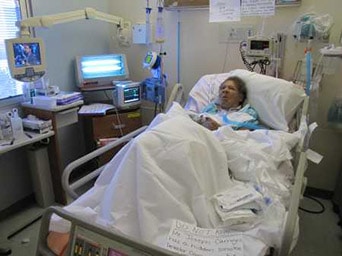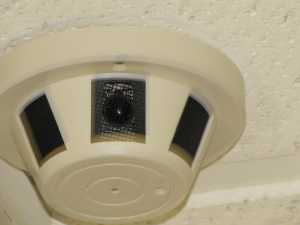

By William R. Levesque, Times Staff Writer
(July 10, 2012 ) – TAMPA — Joseph Carnegie’s son-in-law last month noticed an odd-looking smoke detector on the ceiling of the severely brain-damaged 80-year-old’s private room at the James A. Haley VA Medical Center.
It wasn’t there the day before.
The son-in-law, Mike Coleman, took a closer look that day, June 15. He thought he could see a tiny camera lens inside. His wife, Natalie Carnegie, asked a nurse, who she said assured her it was just a new smoke alarm.
In fact, it was a camera.
Officials of the Department of Veterans Affairs hospital confirmed to the Tampa Bay Times that they ordered the installation of a small camera in Carnegie’s room without his family’s consent. They say it is medically necessary to monitor Carnegie’s fragile health 24 hours a day.
Haley administrators deny it is a hidden camera, though they could not explain why they selected this particular model. The camera’s manufacturer, Vonnic, describes it like this on its website: “C401W Smoke Detector Covert Camera.”

Carnegie’s daughter, Natalie, 42, said it was installed without the family’s knowledge after it became clear to Haley the family might sue the VA for negligence. They say poor care left the Air Force veteran brain-damaged and unable to communicate.
Roy Hawkins Jr., Haley’s deputy administrator, said Haley officials knew of the litigation threat, but said the camera is simply to monitor patient health, much like a heart monitor or other technology.
In an interview last week, Hawkins said a VA facility can put a camera in the hospital room of any veteran without his or her consent or notice, and that it poses no privacy issues.
A VA spokesman in Washington, D.C., did not return a call asking if this was VA policy.
“It was for patient safety,” Hawkins said. “We were interested in monitoring his care more closely and elected to use technology to assist us in doing that as with any other patient.”
Hawkins, who said the use of room cameras is routine, said the camera will remain even though Carnegie’s family objects.
On Friday, he acknowledged the camera was installed without their knowledge.
“They feel that because it was not communicated with them, it perhaps means it was done in secret,” Hawkins said. “It wasn’t. We do not usually notify a family when we install a camera.”
In a second interview Monday, Hawkins reversed himself, saying the family had been told before the camera was installed.
“I know that my father would not want that camera in his face,” said Natalie Carnegie. “Everybody is watching him. They have robbed a veteran of every ounce of dignity. They are taking advantage of his vulnerability.”
Veteran advocates said they are puzzled by the camera’s use.
“The invasion of privacy is stark,” said Gordon Erspamer, a San Francisco lawyer who has represented veterans groups in VA litigation. “This is a lot different than a heart monitor. Give me a break.”
Joe Davis, a spokesman for Veterans of Foreign Wars, said he could see where a camera could be a useful to doctors and nurses. But hidden cameras, he said, should always be out of bounds.
“If you’re going to install a camera, then install a camera,” Davis said. “Why hide it in a fake smoke detector? It implies Big Brother.”
Carnegie, a retired construction foreman, lives near Atlanta. Last summer, he was on vacation in South Florida when he took ill with high-blood sugar and went to a VA hospital. Carnegie soon got a severe infection from an IV.
But Carnegie soon improved, his family said, and he transferred to Haley in August for more care and to be closer to home.
It was in August, Natalie Carnegie said, when Haley personnel failed to notice that mucus and material from a feeding tube had accumulated in his throat. She said her father lay flat on his back, which allowed the material to collect and cut off air. He went into cardiac arrest and suffered severe brain damage.
The family blames the hospital, saying a nurse told supervisors she had too many patients to adequately monitor Carnegie. Haley officials say staffing issues played no part in the episode.
Dr. Edward Cutolo, Haley’s chief of staff, said the reason for the cardiac arrest may never be known, but said the collection of mucus is one possibility.
“It did occur at our facility, on our watch, and we take responsibility . . . and apologized to the family,” he said. “I have personally and so has (Kathleen Fogarty, Haley’s director). It’s not something we wanted to happen.”
Hawkins said the camera was medically necessary to monitor Carnegie, but he also acknowledged the decision to use it came after repeated family complaints about Carnegie’s care.
Much about the camera is disputed.
Natalie Carnegie and her husband say sympathetic nurses have told her the camera was ordered by Fogarty. This could not be confirmed, though Cutolo said “senior leadership” was involved.
The Carnegies said they have also been told the camera was recording images.
Hawkins said that is untrue, noting the camera image (without audio) is watched live only by medical personnel in a nearby room, where telemetry from other devices is displayed.
Haley could not say how many of these cameras are in use, though officials say no others are installed in the wing of the fourth floor where Carnegie is located.
Other non-VA hospitals do occasionally use cameras to monitor patients, according to those in the industry.
John Dunn, a spokesman for Tampa General Hospital, said his hospital uses cameras in rooms in limited circumstances, such as when a patient is a suicide risk.
He said consent is generally not required, but TGH patients are told about the cameras.
The Carnegie family is upset by one other thing.
VA police were called to Carnegie’s room last month when the family tried to take a picture of his daughter, Pamela Carnegie-Lightbourne, with her father.
The hospital explained the family was told its rules prohibited cameras on the premises.
William R. Levesque can be reached at levesque@tampabay.com or (813) 226-3432.
Source: www.tampabay.com
ATTENTION READERS
We See The World From All Sides and Want YOU To Be Fully InformedIn fact, intentional disinformation is a disgraceful scourge in media today. So to assuage any possible errant incorrect information posted herein, we strongly encourage you to seek corroboration from other non-VT sources before forming an educated opinion.
About VT - Policies & Disclosures - Comment Policy



